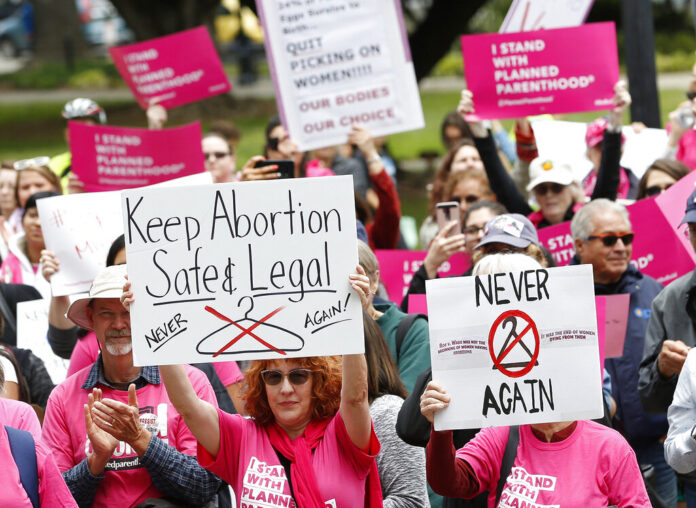
By Adam Beam, The Associated Press
California Gov. Gavin Newsom signed more than a dozen new abortion laws Tuesday, including some that deliberately clash with restrictions in other states — a sign of the coming conflicts that must be sorted out as lawmakers rush to set their own rules now that Roe v. Wade has been overturned.
Most abortions are now illegal in 13 states, and others — including Texas, Oklahoma and Idaho — allow people to sue anyone who performs or aids in an abortion. Meanwhile, Democratic-led states like California, New York and Connecticut have been writing and passing laws to make it easier to get an abortion, with California promoting its abortion services on a state-funded website designed in part to reach women who live in other states.
Conflicts seem inevitable as more people travel for abortions in the coming years, especially with California and Oregon prepared to spend millions of taxpayer dollars to help pay for things like travel, lodging and child care. On Tuesday, Newsom signed a number of laws meant to thwart investigations from other states seeking to prosecute or penalize abortion providers and volunteers in California.
The laws block out-of-state subpoenas, empowering the state insurance commissioner to punish health insurance companies that divulge information about abortions to out-of-state entities. They ban police departments and corporations from cooperating with out-of-state investigations regarding abortions that are legally obtained in California. And they shield prison inmates from other states’ anti-abortion laws.
“An alarming number of states continue to outlaw abortion and criminalize women, and it’s more important than ever to fight like hell for those who need these essential services,” Newsom said in a news release announcing the signings.
If another state tries to apply its laws against someone in California, and California officials say they can’t do that, there is “a lot of gray area as to who is right in that situation,” said Mary Ziegler, the Martin Luther King Jr. professor of law at the University of California, Davis.
“If you are talking about a state applying its criminal laws outside its borders, there’s just not a lot of guidance about how that plays out,” Ziegler said.
It’s not just California. Democratic governors in Colorado, North Carolina, Minnesota, New Mexico, Nevada, Washington, Rhode Island and Maine have all signed executive orders aiming to protect abortion providers and volunteers. Connecticut was the first state to pass a law protecting abortion providers and others, signed in May even before the U.S. Supreme Court overturned Roe v. Wade.
Newsom this year signed a law that would block the enforcement of some out-of-state court judgments against doctors and volunteers for legally obtained abortions in California — a law anti-abortion activists argue is illegal because of a clause in the U.S. Constitution that requires each state to give “full faith and credit” to the laws of every other state.
California Democrats say the law is legal because federal courts have recognized some exceptions to that clause, including when laws in one state violate the public policy of another state.
Still, the legal uncertainty could end up hindering people who work in the field of abortion, Ziegler said.
“What that would mean is the person from California would have a hard time traveling to a lot of places, especially if the judgment is out against them,” she said.
Public opinion polls have shown a majority of California voters, including Republicans, support abortion protections, making it difficult for opponents to stop such bills from becoming law. Still, California Family Council President Jonathan Keller said the group is “investigating which of these laws are ripe for a court challenge.”
One early candidate: a law that requires religious employers to tell their workers about publicly available abortion services. Keller noted a previous California law that instructed crisis pregnancy centers to tell patients about abortion services was struck down by the U.S. Supreme Court in 2018.
Newsom is expected this week to sign a law that would authorize as much as $20 million in public spending to help pay for women in other states to come to California for an abortion, something Keller said he and his group are the most concerned about.
“He’s not inviting (women) to get a state-paid trip for labor and delivery if they live in a county or state with poor maternal mortality, instead (he’s) saying you can come here on the taxpayers’ dime, but only if it is to end your pregnancy,” Keller said.
Democratic Assemblymember Cristina Garcia said California’s new laws would save lives, arguing that abortion bans don’t stop abortions but instead lead to “unsafe and deadly abortions for communities of color, low-income communities, trans and other marginalized communities,” adding: “We promise to be a refuge state for anyone seeking an abortion.”
Most of the laws Newsom signed Tuesday were inspired by the California Future of Abortion Council, a group of 46 public officials and abortion rights groups that began planning last year on what to do if the U.S. Supreme Court overturned Roe v. Wade.
Newsom approved several of the group’s ideas Tuesday, including new laws to let some nurse practitioners perform abortions without a doctor’s permission, establish scholarships for students studying to provide abortions, and stop officials from prosecuting women for pregnancy loss.
“California is showing what is possible when leaders listen to experts, facts, science, and from the people who are directly impacted,” said Jodi Hicks, president and CEO of Planned Parenthood Affiliates of California.
Newsom also signed several laws Tuesday that were endorsed by the California Women’s Caucus, including one that stops retailers from charting different prices on goods based on what gender they are marketed to and a law requiring employers to make pay scale information available to employees and included in job postings.
____
Get out and VOTE! Read the Voice & Viewpoint’s Official Voting Guide for the Nov. 8 Midterms



